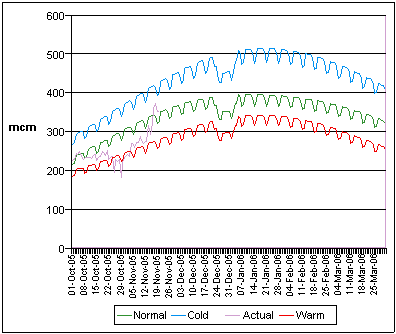Actually no. Although if you take forwards the extraction rates of an average of 431 GWh from Long Term storage then we only have 73 days of gas left in storage at that rate. Between 50 and 70 million cubic metres of gas is being taken from storage each day at the moment.
Demand has jumped recently

This is a graph of demand from the National Grid.
Clearly as to be expected gas demand has jumped massively in November.
A lot of gas (11 days of total British Consumption) is stored by Centrica and is the Long Term Storage. If this runs short then we would be short say about 60 mcm a day which is about 1/6th of total usage. A serious problem, but not strictly "running out" of gas.
Press Release
John Hemming MP has written to Malcolm Wicks MP to ask him to identify what urgent action the government will be taking given that current extract rates from storage predict that we could run out of stored natural gas by the end of February 2006.
An analysis released today by Energy Campaigning MP John Hemming has revealed that the demand today is running at more than 20 Million Cubic Metres (mcm) greater than the normal seasonal demand and that gas supply is clearly constrained.
"The basic assumptions for capacity in the National Grid's Winter Outlook 2005 is 357 mcm/d excluding storage. Gas usage on Sunday (20/11) was 353 mcm as opposed to a seasonal normal of 326 mcm (ie 27,000,000 cm more than normal for this time of year). The forecast demand today is 375 mcm. This is already over the basic capacity assumption.
"Sunday's supply, however, was only 275 mcm from beach as opposed to the forecast 303 mcm a shortfall of 28 mcm and 32 mcm from the interconnector a shortfall of 10 mcm. This left 56 mcm being taken from storage. The average 7 day flow is 269 mcm from beach and 33 mcm from the interconnector. This implies an average Sunday shortfall of 50 mcm and weekdays at 70 mcm."
"On Saturday 393 GWh was withdrawn from long term storage and on Sunday 469 Gwh was withdrawn. The average rate is 431 GWh. Long term storage has 34198 GWh currently which is 26392 greater than the safety minimum of 7806. This rate of flow could be sustained for 61 days. There is 6565 GWh in Short and Medium Term which is 5173 more than the safety margin of 1392 which gives an additional 12 days. This gives a total of 73 days if nothing changes."
"Clearly things will change. However, it is normal practise for demand to peak around 14th Jan. If we are producing less gas than was originally estimated and also consuming more then there is need for the government to come clean on natural gas. I am not saying that we should press the panic button as yet, but at least we should find out where it is."
"At a guess I think quite a few people switched on their central heating last week."
Demand has jumped recently

This is a graph of demand from the National Grid.
Clearly as to be expected gas demand has jumped massively in November.
A lot of gas (11 days of total British Consumption) is stored by Centrica and is the Long Term Storage. If this runs short then we would be short say about 60 mcm a day which is about 1/6th of total usage. A serious problem, but not strictly "running out" of gas.
Press Release
John Hemming MP has written to Malcolm Wicks MP to ask him to identify what urgent action the government will be taking given that current extract rates from storage predict that we could run out of stored natural gas by the end of February 2006.
An analysis released today by Energy Campaigning MP John Hemming has revealed that the demand today is running at more than 20 Million Cubic Metres (mcm) greater than the normal seasonal demand and that gas supply is clearly constrained.
"The basic assumptions for capacity in the National Grid's Winter Outlook 2005 is 357 mcm/d excluding storage. Gas usage on Sunday (20/11) was 353 mcm as opposed to a seasonal normal of 326 mcm (ie 27,000,000 cm more than normal for this time of year). The forecast demand today is 375 mcm. This is already over the basic capacity assumption.
"Sunday's supply, however, was only 275 mcm from beach as opposed to the forecast 303 mcm a shortfall of 28 mcm and 32 mcm from the interconnector a shortfall of 10 mcm. This left 56 mcm being taken from storage. The average 7 day flow is 269 mcm from beach and 33 mcm from the interconnector. This implies an average Sunday shortfall of 50 mcm and weekdays at 70 mcm."
"On Saturday 393 GWh was withdrawn from long term storage and on Sunday 469 Gwh was withdrawn. The average rate is 431 GWh. Long term storage has 34198 GWh currently which is 26392 greater than the safety minimum of 7806. This rate of flow could be sustained for 61 days. There is 6565 GWh in Short and Medium Term which is 5173 more than the safety margin of 1392 which gives an additional 12 days. This gives a total of 73 days if nothing changes."
"Clearly things will change. However, it is normal practise for demand to peak around 14th Jan. If we are producing less gas than was originally estimated and also consuming more then there is need for the government to come clean on natural gas. I am not saying that we should press the panic button as yet, but at least we should find out where it is."
"At a guess I think quite a few people switched on their central heating last week."
Comments